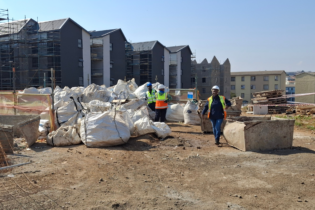Stellenbosch University’s iShack project, which aims for “improved” shacks, allowed for incremental upgrading of informal settlements, enabling residents to assess services such as electricity and sanitation, the university’s Mark Swilling said on Friday.
Although the Department of Human Settlements has committed to eradicating informal settlements, more than 1.1 million South African households live in informal settlements. Moreover, there have been increasing levels of protest — often violent — over the lack of service delivery nationwide. “The government has committed to incremental upgrading of informal settlements…. What that means in practice is that communities have to wait for the electricity and water grid to arrive,” Prof Swilling said. “Research shows that can take on average eight years. This project (shows) there are interventions available that can improve conditions significantly prior to the commencement of a formal upgrade.” The iShack project is a collaboration between Stellenbosch University’s TsamaHub, Stellenbosch municipality and the Sustainability Institute and the Informal Settlement Network. Started at the beginning of last year, the National Research Foundation has funded the project, which Prof Swilling estimates has a total price tag of R500 000. However, he said the project had received a large grant and would be looking to expand its work, although he would not disclose the amount or the donor.The project has two layers. One is the building of new shacks or the retrofitting of existing structures with insulation, solar panels, water harvesting and — in future — sanitation solutions.
The other is to create a business model for the provision of services amongst residents. “iShack started as a physical intervention in the Enkanini township, (building a shack) using the same materials that common shacks are built out of,” Lauren Tavener-Smith, one of the post-graduate students working on the project, said yesterday. “The retrofit iShacks are retrofitted with insulating material and a solar system.” A new iShack costs about R5 500, Prof Swilling said, while the insulation was about R500 and the solar panel — which could power three lights and a cellphone charger — had a price tag of R2500. “Poor people tend to pay an enormous amount for energy,” he said, estimating illegal connections to surrounding areas at R200-R400 a month and candles and paraffin at R75 a month. John van Breda, project manager of the TsamaHub which is part of the university’s HOPE project, said there were plans to scale up the project. “The aim is to refine the design principles and operational systems for elsewhere.” Source: BusinessDay wilds@bdfm.co.za





